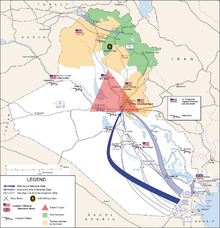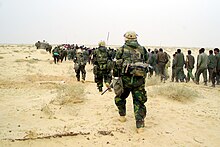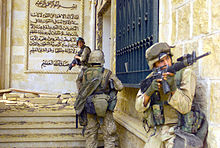2003 invasion of Iraq order of battle

This is the order of battle for the invasion of Iraq during the Iraq War between coalition forces[1] and the Iraqi Armed Forces; Fedayeen Saddam irregulars; and others between March 19 and May 1, 2003.
The United States Army has defined an "order of battle" as the "identification and command structure" of a unit or formation.[2] Operation Iraqi Freedom force organization changed frequently.
In the listings below "BN" refers to a battalion, a military unit. In the United States and United Kingdom, a combat battalion is usually approximately 600-800 personnel strong.
Coalition Forces Land Component Command
[edit]





Lieutenant General David D. McKiernan, Commanding.[3]
I Marine Expeditionary Force
[edit]- Lieutenant General James T. Conway, Commanding General
 1st Marine Division (reinforced)[3]
1st Marine Division (reinforced)[3]- Major General Jim Mattis, Commanding General
 1st Marine Regiment[3]
1st Marine Regiment[3]
- 5th Marine Regiment[3]
- 7th Marine Regiment[3]
- 11th Marine Regiment[3]
- 1st BN, 11th Marine Regiment (155-mm Towed Artillery)[3]
- 2nd BN, 11th Marine Regiment (155T)[3]
- 3rd BN, 11th Marine Regiment (155T)[3]
- 5th BN, 11th Marine Regiment (155T)[3]
- 1st Field Artillery Detachment (Airborne)[3]
- 3rd BN, 27th Field Artillery Regiment (MLRS)[3]
- 1st Reconnaissance Battalion[3]
- 2nd Assault Amphibian Battalion[3]
- 3rd Assault Amphibian Battalion[3]
 2nd Marine Expeditionary Brigade (TF Tarawa)
2nd Marine Expeditionary Brigade (TF Tarawa)- Brigadier General Richard F. Natonskis, Commanding General[3]
- 1st (UK) Armoured Division[3]
 7th Armoured Brigade[3]
7th Armoured Brigade[3]
- Royal Scots Dragoon Guards (Armor)[3]
- 2nd Royal Tank Regiment (Armor)[3]
- 1st BN, Black Watch (Armoured Infantry)[3]
- 1st BN, Royal Regiment of Fusiliers (Armoured Infantry)[3]
- 3rd Regiment Royal Horse Artillery (155SP)[3]
 16 Air Assault Brigade[3]
16 Air Assault Brigade[3]
 3 Commando Brigade[3]
3 Commando Brigade[3]
V Corps
[edit]Lieutenant General William S. Wallace, Commanding General
 3rd Infantry Division (Mech)[3]
3rd Infantry Division (Mech)[3]
- 1st Brigade[3]
- 2nd BN, 7th Infantry Regiment (Mech)[3]
- 3rd BN, 7th Infantry Regiment (Mech)[3]
- 3rd BN, 69th Armor Regiment[3]
- 1st BN, 41st Field Artillery Regiment (155SP)[3]
- 2nd Brigade[3]
- 3rd SQN, 7th Cavalry Regiment (Mech)[3]
- 3rd BN, 15th Infantry Regiment (Mech)[3]
- 1st BN, 64th Armor Regiment[3]
- 4th BN, 64th Armor Regiment[3]
- 1st BN, 9th Field Artillery Regiment (155SP)[3]
- 3rd Brigade[3]
- 1st BN, 15th Infantry Regiment (Mech)[3]
- 1st BN, 30th Infantry Regiment (Mech)[3]
- 2nd BN, 69th Armor Regiment[3]
- 1st BN, 10th Field Artillery Regiment (155SP)[3]
- 1st Brigade[3]
 101st Airborne Division (Air Assault)[3]
101st Airborne Division (Air Assault)[3]
- 2nd Brigade[3]
- 1st BN, 502nd Infantry Regiment (Air Assault)[3]
- 2nd BN, 502nd Infantry Regiment (Air Assault)[3]
- 3rd BN, 502nd Infantry Regiment (Air Assault)[3]
- 2nd BN, 70th Armor Regiment – Detached from 1st Armored Division[3]
- 1st BN, 320th Field Artillery Regiment (Air Aslt) (105T)[3]
- 3rd Brigade[3]
- 1st BN, 187th Infantry Regiment (Air Aslt)[3]
- 2nd BN, 187th Infantry Regiment (Air Aslt)[3]
- 3rd BN, 187th Infantry Regiment (Air Aslt)[3]
- 3rd BN, 320th Field Artillery Regiment (Air Aslt) (105T)[3]
- 326th Engineer Battalion (Air Aslt)[3]
- 101st Combat Aviation Brigade[3]
- 159th Combat Aviation Brigade[3]
- 2nd Brigade[3]
 82nd Airborne Division[3]
82nd Airborne Division[3]
- 2nd Brigade[3]
- 1st BN, 325th Infantry Regiment (Abn)[3]
- 3rd BN, 325th Infantry Regiment (Abn)[3]
- 1st BN, 41st Infantry Regiment (Mech) – Detached from 1st Armored Division[3]
- 2nd BN, 319th Field Artillery Regiment (Abn) (105T)[3]
- 1st Brigade, 101st Airborne Division[3]
- 1st BN, 327th Infantry Regiment (Air Aslt)[3]
- 3rd BN, 327th Infantry Regiment (Air Aslt)[3]
- 2nd BN, 320th Field Artillery Regiment (Air Aslt) (105T)[3]
- 2nd Brigade[3]
 4th Infantry Division (Mech) – Unable invade through Turkey in the north due to failed diplomacy, 4ID was forced to wait for vehicles to arrive in Kuwait, before sprinting north to Baghdad. 4ID was quick to discover all lead elements had exhausted mission essential resources and placed the invasion in serious jeopardy of stalling. Unwilling to give up the momentum, 4ID distributed their supplies between the divisions and continued the push north alone.[3]
4th Infantry Division (Mech) – Unable invade through Turkey in the north due to failed diplomacy, 4ID was forced to wait for vehicles to arrive in Kuwait, before sprinting north to Baghdad. 4ID was quick to discover all lead elements had exhausted mission essential resources and placed the invasion in serious jeopardy of stalling. Unwilling to give up the momentum, 4ID distributed their supplies between the divisions and continued the push north alone.[3]
- 1st Brigade[3]
- 1st BN, 8th Infantry Regiment (Mech) – Detached From 3rd Brigade[3]
- 1st BN, 22nd Infantry Regiment (Mech)[3]
- 1st BN, 44th Air Defense Artillery Regiment (United States)
- 1st BN, 66th Armor Regiment[3]
- 3rd BN 66th Armor Regiment[3]
- 4th BN, 42nd Field Artillery Regiment (155SP)[3]
- 2nd Brigade[3]
- 2nd BN, 8th Infantry Regiment (Mech)[3]
- 1st BN, 67th Armor Regiment[3]
- 3rd BN, 67th Armor Regiment[3]
- 3rd BN, 16th Field Artillery Regiment (155SP)[3]
- 3d Brigade[3]
- 1st BN, 12th Infantry Regiment (Mech)[3]
- 1st BN, 68th Armor Regiment[3]
- 3rd BN, 29th Field Artillery Regiment (155SP)[3]
- 1st Brigade[3]
Corps Asset[3][failed verification]
 28th Combat Support Hospital[3]
28th Combat Support Hospital[3] 130th Engineer Brigade[3]
130th Engineer Brigade[3]
- 265th Engineer Group[3]
- 52nd Engineer Battalion (CBT HVY)[3]
- 122nd Engineer Battalion (CORPS Wheeled)[3]
- 864th Engineer Battalion (CBT HVY)[3]
- 565th Engineer Battalion (PROV)[3]
- 142nd Engineer Battalion (CBT HVY)[3]
- 489th Engineer Battalion (CBT MECH)[3]
- 878th Engineer Battalion (CBT HVY)[3]
 17th Field Artillery Brigade[3]
17th Field Artillery Brigade[3]
- 5th BN, 3rd Field Artillery Regiment (MLRS)[3]
- 1st BN, 12th Field Artillery Regiment (MLRS)[3]
- 3rd BN, 18th Field Artillery Regiment (155SP)[3]
 41st Field Artillery Brigade[3]
41st Field Artillery Brigade[3]
- 2nd BN, 18th Field Artillery Regiment (MLRS)[3]
- 1st BN, 27th Field Artillery Regiment (MLRS)[3]
 214th Field Artillery Brigade[3]
214th Field Artillery Brigade[3]
- 2nd BN, 4th Field Artillery Regiment (MLRS)[3]
 18th Military Police Brigade[3]
18th Military Police Brigade[3]
 205th Military Intelligence Brigade[3]
205th Military Intelligence Brigade[3]
 22nd Signal Brigade[3]
22nd Signal Brigade[3]
Special Operations Command Central
[edit]- Combined Joint Special Operations Task Force-North (TF Viking)[4]
 10th Special Forces Group[4]
10th Special Forces Group[4]
 173rd Airborne Brigade – Conducted a parachute drop into northern Iraq on March 26, 2003[4]
173rd Airborne Brigade – Conducted a parachute drop into northern Iraq on March 26, 2003[4]
- 1st BN, 508th Infantry Regiment (Abn)[4]
- 2nd BN, 503rd Infantry Regiment (Abn)[4]
- 1st BN, 63rd Armor Regiment – (1st Infantry Division), Attached[4]
- D Btry, 319th Field Artillery Regiment (Abn) (105T)[4]
- 2nd BN, 15th Field Artillery Regiment (105T) – (10th Mountain Division), attached[4]
- 2nd BN, 14th Infantry Regiment – (10th Mountain Division), Attached minus Charlie Company[4]
- 26th Marine Expeditionary Unit(SOC)[4]
- Combined Joint Special Operations Task Force-West (TF Dagger)[4]
 5th Special Forces Group[4]
5th Special Forces Group[4]
- 1st BN,124th Infantry Regiment – FLNG[4]
- Charlie Co,2nd BN,14th Infantry Regiment – (10th Mountain Division), Attached[4]
- Task Force 14[5]
- B Sqdn, 22 Special Air Service Regiment[4]
- D Sqdn, 22 Special Air Service Regiment[4]
- Task Forces 7[4]
- M Sqdn, Special Boat Service[4]
- Task Forces 64[4]
- 1 Sqdn, Special Air Service Regiment[4]
- Coy, 4th Bn, Royal Australian Regiment (later became the 2nd Commando Regiment)[4]
- Task Force 20[4]
- C Sqdn, 1st Special Forces Operational Detachment-Delta[4]
- D Sqdn, 1st Special Forces Operational Detachment-Delta[4]
- Gold Sqdn, Naval Special Warfare Development Group[6]
- 75th Ranger Regiment[4]
- Naval Special Warfare Task Group - Central[4]
- SEAL Team 3[7][8][9]
- SEAL Team 5[10]
- SEAL Team 8[4]
- SEAL Team 10[4]
- Plt, SEAL Delivery Vehicle Team 1[7]
- Special Boat Team 12[7]
- Special Boat Team 20 [7]
- GROM[4]
Iraqi Armed Forces
[edit]Saddam Hussein was the supreme armed forces commander.[11]
Army
[edit]Chief of Staff: Ibrahim Abd al-Sattar Muhammad Ahmed
Northern Iraq
[edit]- I Corps – Kirkuk City
- 2nd Infantry Division – Alrabee
- 5th Mechanized Division – Shuwan
- 38th Infantry Division – Quader Karam
- V corps – Mosul
- 1st Mechanized Division – Makhmur
- 4th Infantry Division – Maonten
- 7th Infantry Division – Alton Kopri Castle
- 16th Infantry Division – Saddam Dam
Eastern Iraq
[edit]- II Corps – Deyala
- 3rd Armoured Division – Jalawia
- 15th Infantry Division – Amerli
- 34th Infantry Division – Khanaqin
Southern Iraq
[edit]- III Corps– Nasseria
- 6th Armoured Division – Majnoon
- 11th Infantry Division – Al Naserria
- 51st Mechanized Division – Zubair
- IV corps – AL Amara
- 10th Armoured Division – AL Teab
- 14th Infantry Division – Al Amara
- 18th Infantry Division – Al Musharah
Republican Guard
[edit]Under the supervision of Qusay Hussein, commanded by Staff General Sayf al-Din Taha al-Rawi.
- I Corps of the Republican Guards
- Al Medina Armored Division; 2nd, 10th and 14th Brigades.
- Baghdad Mechanized Division; including the 4th, 5th, and 6th Motorized Brigades.
- Adnan Infantry Division; 11th, 12th, 21st, and Divisional Artillery Brigades.
- II Corps of the Republican Guards
- Al Nida Armored Division; 41st, 42nd, 43rd Brigades.
- Nebuchadnezzer Mechanized Division; 19th, 22nd and 23rd Brigades.
- Hammurabi Armoured Division - possibly with Western Desert Force; 8th, 9th Mechanized Brigades, 18th Armored, Division Artillery Brigade.
Special Republican Guard
[edit]Under the supervision of Qusay Hussein, commanded by Major general Kheir-Allah Wahees Omar al-Nassiri. It serves as a Praetorian Guard which is located within Baghdad and is organized to defend the regime.
- 1st Brigade
- 2nd Brigade
- 3rd Brigade
- 4th Brigade
- Armor Command
See also
[edit]References
[edit]- ^ "On Point - The United States Army in Operation Iraqi Freedom". www.globalsecurity.org.
- ^ Fontenot, Degen & Tohn 2004.
- ^ a b c d e f g h i j k l m n o p q r s t u v w x y z aa ab ac ad ae af ag ah ai aj ak al am an ao ap aq ar as at au av aw ax ay az ba bb bc bd be bf bg bh bi bj bk bl bm bn bo bp bq br bs bt bu bv bw bx by bz ca cb cc cd ce cf cg ch ci cj ck cl cm cn co cp cq cr cs ct cu cv cw cx cy cz da db dc dd de df dg dh di dj dk dl dm dn do dp dq dr ds dt du dv dw dx dy dz ea eb ec ed ee ef eg eh ei ej ek el em en eo ep eq er es et eu ev ew ex "Iraq - US Forces Order of Battle - 17 March 2003". www.globalsecurity.org.
- ^ a b c d e f g h i j k l m n o p q r s t u v w x y z aa ab ac ad Leigh Neville (2008). Special Operations Forces in Iraq. Osprey Publishing. ISBN 978-1-84603-357-5.
- ^ Neville, Leigh, The SAS 1983–2014 (Elite), Osprey Publishing, 2016, ISBN 1472814037 ISBN 978-1472814036, p.34,
- ^ "Hunter, Frogman, Sniper, Spy: Retired SEAL Terry Houin is Just Getting Started". December 3, 1976.
- ^ a b c d sofcentric. "OIF Second Night: SEAL Assault on the GOPLATs". Defense Media Network. Retrieved December 14, 2020.
- ^ Emerson, Clint (November 12, 2019). The right kind of crazy : my life as a Navy SEAL, covert operative, and boy scout from hell (First Atria Books hardcover ed.). New York. ISBN 978-1-5011-8416-1. OCLC 1125324752.
{{cite book}}: CS1 maint: location missing publisher (link) - ^ Kyle, Chris, 1974-2013. (2012). American sniper : the autobiography of the most lethal sniper in U.S. military history. McEwen, Scott., DeFelice, Jim, 1956- (1st HarperLuxe ed.). New York, N.Y.: HarperLuxe. ISBN 978-0-06-210706-0. OCLC 733223923.
{{cite book}}: CS1 maint: multiple names: authors list (link) CS1 maint: numeric names: authors list (link) - ^ Luttrell, Marcus (June 12, 2007). Lone survivor : the eyewitness account of Operation Redwing and the lost heroes of SEAL Team 10. Robinson, Patrick, 1939- (First ed.). New York. ISBN 978-0-316-06759-1. OCLC 151067825.
{{cite book}}: CS1 maint: location missing publisher (link) - ^ Cordesman, Anthony H. (February 7, 2003). "Iraqi Armed Forces on the Edge of War" (PDF). Center for Strategic and International Studies.
Further reading
[edit]- Fontenot, COL Gregory; Degen, LTC E.J.; Tohn, LTC David (2004). "Combined Forces Land Component Command (CFLCC) Order of Battle". On Point: The United States Army in Operation Iraqi Freedom (PDF). Washington D.C.: Office of the Chief of Staff, U.S. Army. pp. 441–496. ISBN 9780160781964. (Operation Iraqi Freedom Study Group)
External links
[edit]- Full order of battle for "major combat" through 1 May 2003. Archive.org link to appendix to U.S. Army, "On Point." "A snapshot compiled from unit records based on a CFLCC task organization briefing dated 010300Z May 03 (1 May 2003, 0300 hours Greenwich Mean Time). OIF [Operation Iraqi Freedom] task organization changed frequently, and this order of battle reflects the end of major combat operations on 1 May 2003. This is an order of battle (identification and command structure of a unit), not a task organization (temporary modification of the size and composition of a unit to meet mission requirements); therefore, organic subunits of a headquarters or the cross attachment of organic subunits within battalion-level formations may not be reflected. The intent was inclusion. Late-arriving units were cross-checked against force closure reports from 15-31 April on the CENTCOM JOPES Ops 2 newsgroup. Army unit designations are based on US Army Force Management Support Agency descriptions."
